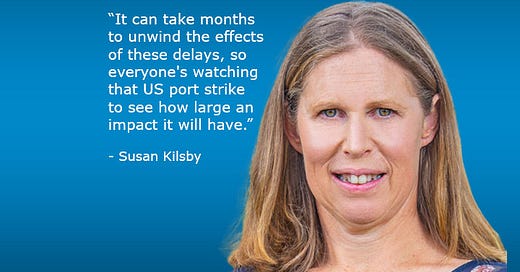Global markets are skittish this morning on fears the conflict in the Middle East will lift oil prices. Australia’s labour market and services sector remain resilient in PMI data, and NZ house prices fall again, despite the RBNZ starting rate cuts.
In our bonus Deep Dive interview, ANZ Agriculture Economist Susan Kilsby looks at what the US dock workers’ strike could mean for Australia and New Zealand.
5 things to know:
Markets wobbled overnight on fears a widening conflict in the Middle East may endanger oil supplies. Brent rose 3.6% to US$77.40/bbl. The S&P 500 fell 0.5% and US Treasury yields were up 4-5 basis points by 4am Sydney/Melbourne time. All eyes tonight are on US non-farm payrolls. ANZ Head of G3 Economics Brian Martin says 155k new jobs would be in line with a Fed cut of 25 bps in November.
Australia’s trade balance held steady at $5.6 billion in August as both imports and exports fell 0.2% in the month. ANZ Economist Maddy Dunk says non-rural exports rose 0.8%, with a fall in iron ore covered by rising coal exports.
The trade balance has now had a number of months of gradual increases since falling from about $18 billion in June 2022 to $4 billion in March 2024. Maddy says it’s still too early to say whether the fall has bottomed out.
Australia’s final Judo Bank Services PMI for September was revised down slightly from its flash reading, although it remained expansionary. The Manufacturing PMI remained in contraction.
New Zealand house prices fell 0.5% in September, taking delines to 4.7% since February, according to Corelogic. ANZ Economist Henry Russell says sales volume data later this month is a key variable.
Cheers
Bernard
PS: Catch you next week as we look to the Reserve Bank of New Zealand’s next rate decision.












